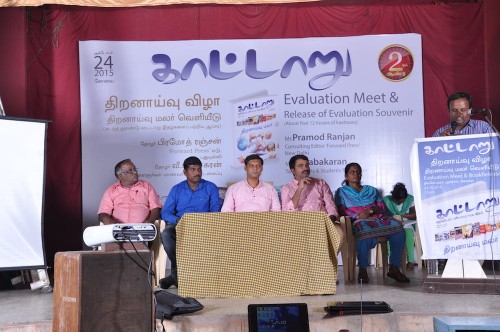
Coimbatore (Tamil Nadu) : In October 2014, Kaattaaru was launched as a monthly magazine. It was not the best time to launch a print magazine given the rising popularity of the internet and social media. But these concerns paled beside the implications of publishing Periyar’s writings and speeches. We’ve been highly motivated and passionate and now we’ve completed a year.
As had been decided earlier, a meeting was held on 24 October 2015 to evaluate the first year of the magazine. Pramod Ranjan, consultant editor, FORWARD Press, was invited to be the chief guest of the programme. V. Prabakaran, coordinator of the Tamil Youth Organization, was the guest of honour. The meeting was held in the Divyodhaya Hall, Coimbatore.
In the July issue of Kaattaaru, we had apprised our readers of our plan to make Periyar’s writings and speeches available on the internet. The plan has been implemented and the website www.periyarwritings.org built. The website was launched at the meeting by Keetru Ramesh, who designed the website at short notice. This was followed by the release of the “Proceedings of the evaluation meeting” by Ranjan.
In his address, Ranjan said that “along with the modern Dalitbahujan icons like Mahatma Jotiba Phule and Babasaheb Dr Bhimrao Ambedkar, many of us in north India hold Periyar E.V.R. (Erode Venkata Ramasamy) in the highest esteem for his pioneering work through the Self-Respect Movement and his writings to annihilate caste and destroy Brahmanism, which is even stronger in north India … Ours is a common struggle – against Brahmanism/Sanskritization. However, we shall never succeed until we are humble and learn from each other – the North from the South and other parts of India, and even the South from the North and other parts of India.
“To start on that path, we need to liberate our great Dalitbahujan icons from their narrow community roots to make them more universal at least across India and South Asia. This will include Jotiba Phule from his Maharashtrian Mali roots, Periyar from his Dravidian roots and Ambedkar from his Maharashtrian SC roots. Sometimes the communities of their birth and their work try to keep these heroes to themselves! This tendency plays into the hands of the brahmanical interests.
“What these great leaders could not spread across India in their own lifetimes their disciples need to do today through word (their writings and writings on them) and action (continuing the fight to annihilate caste and reform society).”
Ranjan concluded his address with an appeal: “I request Ayya Veeramani, Kolathur Mani, Kovai Ramachandran and Suba Veerapandian to help translate Periyar’s writings into Hindi. FORWARD Press will do its part in spreading them throughout north India. Together we can move towards realizing what Phule, Ambedkar and Periyar dreamt of and worked towards – an India free of caste and Brahmanism, where every citizen enjoys dignity, self-respect and social justice.”
Prabhakaran, who is one of the editors of Kaattaaru, also spoke at the meeting. He noted that Kaattaaru had identified potential young writers, including students, and given them opportunities to share their ideas on Periyar and society. Prof Puratchikody, Dr Peiyar Selvi and Ms Veni were the programme hosts. The guests were felicitated: Ranjan by Ms Pollachi Dhanalakshmi, Mr Prabakaran by Prof A. Puratchikody and Keetru Ramesh by Ms Gowri. Ranjan gifted the Kaattaaru team with a copy of Braj Ranjan Mani’s Debrahmanising History.
After a tea break, a formal discussion followed. The participants discussed each issue of Kaattaaru, and had questions for the writers. There was both criticism and appreciation of the writings.
Kaattaaru announced its next mission – to launch “Kudiarasu schools” to spread Periyar’s thoughts and ideas. Prof. T. Marx, Department of English, Pondicherry University was gratefully remembered. He has translated 20 selected titles of Periyar writings from Tamil to English. Now, as Ranjan reminded the audience, we need to emulate him and translate these works into Hindi. At the end of the meeting, a delicious beef biriyani was served to the audience.





